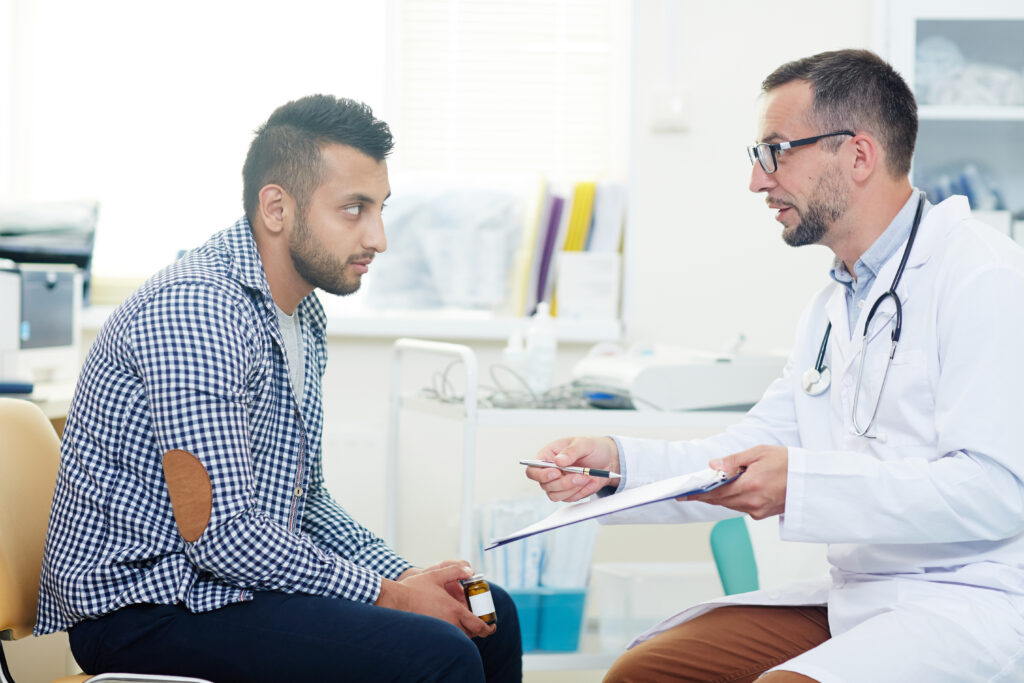
Most sexually active people will eventually contract the human papillomavirus (HPV), with up to 90% of men and 80% of women impacted by this virus at least once. Of the vast strains of HPV that exist, some types cause a condition known as genital warts. These are small, often innocuous lumps that form on the genitals and groin.
Although STDs can feel alienating, genital warts are common and rarely cause long-term complications. Still, to avoid the discomfort of its accompanying symptoms, you'll want to take safe-sex measures to lower your risk of contracting HPV. These are the symptoms of genital warts, how they can be treated, and the role you can play in preventing the spread.
Symptoms of Genital Warts
Genital warts can vary in size, shape, and color and have two common appearances: flat or lifted spots, typically skin-colored or pale, or raised bumps, which may resemble the head of a cauliflower when clustered together. These warts often begin small and soft, which makes them easy to miss in the early stages.
Women are likely to locate genital warts on the interior and exterior of the vagina and/or anus. Warts may also appear within the cervix. For men, warts can appear on the penis, scrotum, anus, and the groin.
Warts may be accompanied by uncomfortable symptoms, including:
- Itchiness
- Changes in urination
- Changes in vaginal discharge
- Burning or tingling
- Light bleeding
In many cases, genital warts will cause few to no symptoms. This is a positive for those living with the condition, though it can make it difficult to self-assess for genital warts, increasing its spreadability.
How Are Genital Warts Spread?
Genital warts are caused by HPV. While upwards of 100 different forms of HPV exist, approximately 40 of them impact the genitals and anus. The two types that primarily cause genital warts are strains 6 and 11. Since those infected with HPV may not develop obvious warts, people may not know they are infected for several months, if at all. This allows HPV to spread between sexual partners easily.
Genital warts are contracted through sexual contact, including unprotected vaginal sex, oral sex, and anal sex. HPV is often fought off by the body's immune system within two years of contracting the disease, but those who don't recover are at higher risk of developing warts, as well as conditions such as cervical cancer. Fortunately, the strains of HPV that cause warts are unlikely to result in serious conditions.
Treating Genital Warts
In many cases, the symptoms of genital warts disappear as the immune system rids the body of HPV. Still, intense discomfort may require treatment to quell symptoms. Some treatments for genital warts include:
- Freezing the warts
- Laser wart removal
- Topical wart removal ointments and creams
- Electrocautery (burning off warts)
- Surgical wart removal
None of these are permanent solutions to genital warts, yet they can address bothersome warts and temporarily relieve troubling symptoms. The HPV virus must clear out of your system before you can expect symptoms of genital warts to cease permanently. There is no treatment for HPV, but managing genital warts can help you with comfort and mobility while your body fights the virus.
If you have contracted this condition, don't panic. Reach out to your healthcare provider to learn about personal health risks and steps you can take to help reduce discomfort.
How Can Genital Warts Be Prevented?
The primary preventative measure against genital warts is the HPV vaccination. This vaccination does not fend off all forms of HPV, yet it does protect against both strains 6 and 11, significantly reducing your chances of developing genital warts. This vaccination is recommended to boys and girls beginning at the age of 11 and consists of two shots administered six months apart. If you cannot receive the vaccination before age 15, you will require three dosages.
Once you become sexually active, the best way to avoid genital warts is to protect yourself against HPV. Primarily, you want to avoid high-risk sex situations. These include unprotected sex, having sex with someone who is uncommunicative about their STD history, or having sex with multiple partners. You should feel empowered to ask potential or current partners to get tested. Additionally, plan to get tested for STDs between partners to ensure you are not living with/spreading HPV.
Through vaccination and safe sex, you can lower your risk of contracting HPV and developing genital warts. If you're uncertain about your STD status or want to learn more about the risks of unprotected sexual activity, consider contacting your healthcare provider or a local sexual health clinic for information on testing, protection, and preventing the spread of STDs.
Resource Links
- "Genital warts" via Mount Sinai
- "Genital warts" via Mayo Clinic
- "Genital warts" via Health Direct
- "How can I prevent getting or spreading genital warts?" via Planned Parenthood
- "Genital warts" via Cleveland Clinic
- "Genital HPV Infection – Basic Fact Sheet" via CDC
- "Genital warts" via NHS Inform
- "Quick Facts: HPV-Associated Cancer" via Minnesota Department of Health





